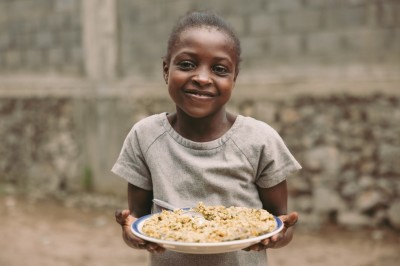The top cause of hunger isn’t what you think

Haiti is facing its worst food crisis in history. Almost half the population doesn’t have enough food to eat.
“The Haitian people are a resilient people. Time after time they face hardships and hard situations, and they still try to move on and continue,” says Abbel Joseph, Compassion Haiti’s senior manager of program support. “But right now, it’s a really catastrophic situation. People are struggling to eat just one meal a day.”
The crisis is largely fueled by conflict: the top cause of hunger worldwide. Sparked by political turmoil in 2021, gang violence has since overwhelmed two regions of the country. Today, almost 100 gangs fight for territory in the capital alone. The United Nations believes 80% of Port-au-Prince is now under gang rule.
The daily looting, violence, kidnappings, and road blockades have brought the city to its knees. Many citizens are living under self-imposed lockdowns to protect their families or have fled their homes altogether. Nearly 200,000 people, half of them children, are displaced across Haiti.
The reign of terror is strangling the country’s economy, driving unemployment, and severely limiting access to food. In gang-controlled urban areas, many households eat just one meal per day. Outside the capital, gang violence is increasing in the Artibonite valley, disrupting Haiti’s food production.
Despite conflict being concentrated in these two areas, the impact devastates the entire country. In Les Cayes, the sleepy region home to the mango tree, parents struggle to feed their children because of violence over a hundred miles away.
“The hard reality is,” says Jonathan Clement, video producer for Compassion Haiti, “when mango season ends, the children don’t know what they’re going to eat next.”
Haiti imports half its food, but gang-run checkpoints and blockades prevent it from getting to households. “Most of the food we eat in Haiti is imported,” explains Clement. “Boats and planes usually land in the capital. With the road blockades, it’s difficult to have trucks deliver food to the south.”
Inflation has risen to almost 50%, causing the price of what food is available to skyrocket. “Even if families had any kind of savings, it’s all been used on food,” says Joseph. “They have nothing left.”
With so much of Haiti’s population suffering, the need can feel overwhelming.
Amid Haiti’s challenges, the support of the local church remains constant. Compassion International’s church partners have stood beside families through earthquakes, hurricanes, political turmoil, and the pandemic. They were there before the food crisis, will be there during, and will remain long after the crisis has finished.
In Haiti, 77 of Compassion’s local church partners have supported more than 7,200 families with food packages and agriculture support, serving an estimated 31,000 children, family members, and caregivers.
“Families in the Compassion program receive a food kit,” says Joseph. “And because of the love of Christ that they’ve encountered through the ministry, they take from what they receive and share it with their neighbor.”
Amid this crisis, local churches in Haiti know God is with them. “Once we have God with us, there is so much hope for the future,” says Joseph. “We know that we can rely on God, and we take him on His Word that He will help us to get through.”
This World Food Day, the world may not be the safest place. But God is still God, and the Church is still the Church.
To learn more about World Food Day and join the church in providing immediate and long-term support to children and families during the global food crisis, visit compassion.com/worldfoodday.
Zoe Noakes is a marketing writer for Compassion International. She lives in Newcastle, Australia.



























